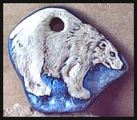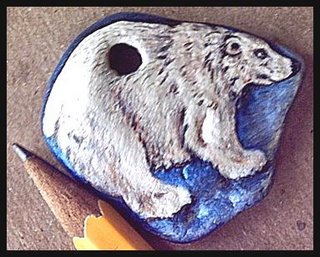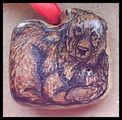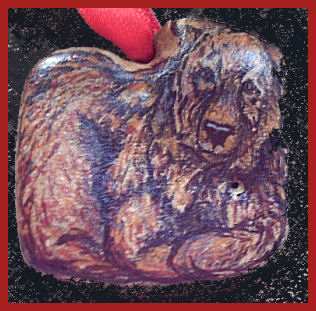 It was a wonderful day when I gathered this oyster shell. I had taken our two dogs, the girls, for a walk to the bay. We lived in coastal Washington State and the ocean sky had painted a brilliant scarlet scene for us to walk under.
It was a wonderful day when I gathered this oyster shell. I had taken our two dogs, the girls, for a walk to the bay. We lived in coastal Washington State and the ocean sky had painted a brilliant scarlet scene for us to walk under.Many of the small buildings scattered along the steep banks are painted blue. I imagine that's due to our forefathers instinctual knowledge of color theory. Maybe that's true, because the shadows on those buildings glow thalo mysteries under the orange flamed sky. Even on the most oppressively overcast of days Gray's Harbor stood alive with color contrast. Rich, earthy browns and royal reds of moist wood on a pallet next to plants that scream yellow from the water hanging in the air filled my eyes -- so bright and so dark at the same time!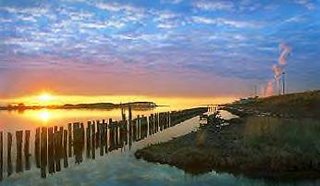
We'd stepped off the road a ways because I'd spotted logs piled in the water. They waited there for their turn in the cedar mill. Hoquiam ... the very name of the river means, "hungry for wood", in Native tongue. The fresh water river for which the town is named flowed passed my feet and into the salty incoming tide. One of those magickal places of in between here nor there was where I was standing. A bald eagle or osprey, I could not tell which, circled lazily above the distant hillside.
I breathed in the fresh air and felt as if the Goddess Herself were filling my lungs! As I stretched in the sunlight I caught a flash of white out of the corner of my eye. The girls had wandered down the bank to the waters edge. They too had been attracted to the pearly white piles along the shore. Like effigy mounds scattered among the rocks stacks of oyster shells sparkled in the sun. It was one of the most odd sights I'd ever seen. The dark logs pushed and shoved against each other like teeth chewing at the air, while the delicate looking shells bobbed here and there in the water as if they were little fairy boats. The jagged rocks along the bank, black and silver with wetness, seemed like predators waiting to pounce on the piles of oyster shell that had invaded their territory. There must have been thousands of shells! They were big too -- the nearest I estimated at ten to twelve inches long! The girls were having a good time chasing sea gulls, so I started to go to work.
It wasn't exactly easy to gather the shells. Tide was coming in fast. The water flowing in from the river mixed with the tide making it a bit like standing in a washing machine, and let us not forget the 75-100 large cedar logs that seemed intent on crushing my bones! The bank was steep and I had to use one hand to hold on to a scotch bloom root jutting out of the large basalt rocks. I marveled at my dogs who maneuvered the rough terrain with such ease! They had four feet to maneuver on whereas I occasionally had but one. I reached for a shell and hoisted it onto the top of the bank. I performed this move over and over again until my arm wore out. I climbed up and gazed upon my prize. Barking dogs woke me from my daze. The girls warned me of the approach of a stranger. A weather worn man with a face right off a box of Gordon's frozen fish walked up to me.
"Are you madd, girl" he exclaimed at me. "Them logs'll eatcha up if they gitta holda ya!"
"Well," I ventured, "These shells were just laying there and I couldn't bear to see them get crushed up -- they're so big. I've never seen oyster shells get so big."
"Yep," he said more relaxed, "don't see 'em that size just a layin' around too often. They brought in a deep sea one and cleaned 'er off right here. Gonna stink to high heaven for a month, it is!"
I assumed, rightly, that he meant a small deep sea-going vessel had pulled into this little inlet to scrape it's hull clean. Apparently it was a greater benefit to risk the mash of logs than it was to go to a proper place for cleaning. I don't know the details of the shipping industry well, but I was able to gather that the action here hadn't been exactly legal. The inlet sat close to the residential area. The smell of the rotting oysters and algae would soon be carried to the town. It was a shame all the way around.
"I'll tell ya what", the turned to me and said, "I promise you all the shells you can take if you promise me to keep otta them there logs. I woulda had go look fer the stink if you and yer dogs haddinta found it fer me. We'll take care of it from here."
With that he motioned to a pick-up truck of men I hadn't even seen. The noise from the crashing logs had covered the sound of the engine approach. They all worked for the lumber company and had been out scouting for illegal activity from foreign boats, unneeded hazards and such. Blessedly the company is very tolerant of peaceful trespassers, as we didn't know we were on timber company property. One of the men gave me a plastic bag from the truck so I could load up the shells I had rescued from below. The guys chuckled at me as I loaded my catch. They enjoyed the sight of a little girl loaded down with stinking, dirty shells. My knees were covered in sandy mud, as was my face I'm sure. With the bag nearly overflowing I gave a whistle for the girls who promptly ran to my side.
"Go on now and let us git our work done. Don't you worry about a thing, the treasure will still be here when ya come fer more." They all chuckled again as I waddled off with my prize.
It was a fair walk to get home with about ten pounds of calcium and mother of pearl in my arms. There were no roads most of the way so the girls were safe being off-leash. They're very well behaved. When we reached the house I discovered, thankfully, that my husband was not yet home from work. I set the bag on the kitchen floor and went to work myself. The shells had to be cleaned and sterilized before I could use them and it wasn't going to smell pretty.
A combination of methods, including lots of elbow grease, yielded shiny results. I had to take special care to preserve the delicate barnacles where I could. The thick green algae was a tough character to remove, I tell you! There were some lovely oyster cluster formations. One cluster of shells even had a bit of bright yellow rope seemingly growing right through the center! Oh, it was worth the effort though, for a crafty girl from Ohio to get her hands on a pile of Pacific art materials! I managed to get the mess cleaned, and myself, before my husband came home, but he was accustomed to expecting quirky things in the kitchen by now.
The next day I returned to the bay with my car. I had ropes and buckets -- everything I thought I might need to safely gather more shells. I hoped some good ones had survived the men's clean-up effort the day before. I parked. To my amazement they shells were piled neatly on the side of the little blue building. The weather worn man emerged from the other side. He greeted me warmly and looked with pride upon the near mountain of oyster shells.
"Think we saved ya a good many of 'em Miss," he said as he tipped his hat like a living cliche`.
It seems the shells only had to be removed from the water to avoid the odor issue. The smell mainly comes from the algae, I suppose. Once they dry a bit it dissipates. But left alone the algae would have gone crazy on the large amount of shells and buried the water surface. This causes environmental issue that are bad for the water and anything in it -- an imbalance, dis-ease. So the shells had to go away.
Those fine, nice men had been as careful as they could, with whatever equipment they use, in pulling out the shells. They liked the idea of the shells being used for something by me instead of just being crushed into the fill dirt, (the entire area is made of filled in false earth). It seemed more natural, he told me. I thought that was fairly ironic because we were standing in a place made by man but formed by nature. The very ground under my feet had been placed there by mankind and twice everyday the ocean tries to wash it away. The man helped me load up the back of my car with shells and a few large driftwood pieces I couldn't resist. Then I drove away thinking.
I had come to this part of the country thinking of man as the invader of nature, ready to rape what he could from the land. The history of the entire Pacific Northwest was made from natural resource industry of one sort or another. But I had seen the look of care in the eyes of those men I'd met. They weren't worried so much about the logs being alginated and rotting. They were concerned for the quality of the water. They understood on a deeper level than most that what we do affects where we do it. Birds, insects, fish and other aquatic creatures -- creatures we in many cases depend on as food -- live in those waters. Those men had a fine understanding of cause and effect. They didn't do their job because they wanted a paycheck only. The folks who work in such wild places are stewards of the land and sea. I drove away with more than crafting treasures. I drove back to town with a better understanding of humanity as a whole.
A quiet understanding of the place of mankind in the Pacific Northwest was creeping into my heart. For the time, that understanding sat next to the spotted owl -- the Greenpeace guru inside me wasn't ready to let go of the "us" and "them" attitude just yet. But I was one step closer to understanding how the people who work the special wild places are, in truth, stewards of both the land and sea. They use the resources, but must care for them too. There's more than job security involved -- it's pure love.
All art work images, unless otherwise credited, copyright Tree Pruitt. Text information may not be used for profit, copyrighted Tree Pruitt. Metaphysical suggestions are intended as entertainment only -- I/we make no claims as to the ability of the action of stones, spells or advise.
Information about hand painted Spiritkeepers ™ stones & shells by WWAO artist, Tree Pruitt.



